MUSIC: Interview with Mikey Heppner of Priestess
11.03.06
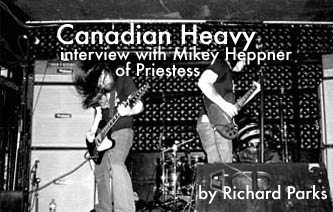 "Hello L.A. We’re Priestess from Montreal and we’re going to fuck you!"
"Hello L.A. We’re Priestess from Montreal and we’re going to fuck you!"
This is how frontman Mikey Heppner greets the sold-out crowd at Spaceland. A few who-does-this-guy-think-he-is snickers rise up through the ether. But hardly are those words out when some vast image of the Spirit of Hard Rock troubles my sight and ears, all brimming up with hair and crazily heavy hooks. And by the time the four piece tags the final cube of guitar fuzz to "Everything That You Are" from their debut record Hello Master (Indica Records), there’s certainly been sufficient long-hair tossing, guitar-as-ax wielding, visible tattoos, twin guitar solos, and general heavy peacock riffage to qualify Priestess as a Second Coming of some primal breed of rock. That is, if rock was ever an attitude towards rebellion, fun, and creating something your parents might not want to listen to. Or using the eff word just for the fuck of it.
Dubbed in the hallowed tradition of good all-male rock bands that assume feminine monikers, Priestess is Heppner (guitar/vocals), Dan Watchorn (guitar/vocals), Mike Dyball (bass), and Vince Nudo (drums/vocals). Yes they are from Montreal, and in that bilingual city, Heppner was once asked to explain his band’s name in an interview with the French-language paper La Presse. His answer that Priestess "is just this heavy name" was translated as "parce que ça sonne metal". Indeed, in the current indie-dominated rock music climate, Priestess might at first sound more than a bit like a heavy metal group, but comparisons to AC/DC, Black Sabbath, and Led Zeppelin get closer to the point than the genre call, which has messy contemporary connotations. It’s in the spirit of these bands that Priestess brings their catchy, high-energy guitar music. But it’s also in the spirit of a Montreal scene that’s been overshadowed by the recent media frenzy over college-radio rock favorites The Arcade Fire et al––a scene of heavy rock bands like Tricky Woo and Bionic.

Hello Master is all about the meticulous organization of tasty guitar riffs––sometimes three or four in a song––around bodacious, pop-influenced melodies. The arrangements create effective dynamics (the odd key or time-signature change, riff-for-riff exchanges, guitar solos in high registers far above the heaviness) that would otherwise be lost completely in the aggressive distorted double-guitar noise. Heppner is a singer, not a screamer, and incredibly his voice holds the melody at the same time that it wails like gargling gravel (Watchorn and Nudo assume lead vocal duties with equal command on a couple tracks). Gus Van Go’s (The Stills, Me Mom & Morgantaler) production uses minimal nuance––there is the odd shaker, tambourine, doubled or reverbed vocals, and Heppner even confirms a bit of piano on two of the tracks buried deep in the mix, "for the percussiveness". There is a wonderful cowbell moment in the anthemic "Run Home". But mainly the record retains the incredible energy and hugeness of the live show with solid guitar and drum sounds––a commendable faithfulness which is the greatest service any recording could do for this group.
The spectacle of Priestess’s performance is profound, and inspired by their expansive on-stage movements, I’m putting together a little how-to pamphlet of performative gestures in contemporary rock’n’roll (see margins for examples). The movements together make the live show a kind of rapturous event which is totally mesmerizing and definitely worth seeing. But the choreography is not contrived––if anything it’s a yielding to the impulses of music that’s just fun to play whether somebody’s watching or not. It’s almost a giving up of the self in the enthusiastic experience of it. And there’s something refreshing about that. Hanging out with the guys after the show and talking about the adventures they’ve had on tour over some drinks I was reminded of a line from Everett True––I’d like to borrow his famous quote about the last great rock band and their ethic…"Basically, this is the real thing. No rock star contrivance, no intellectual perspective, no master plan for world domination. You’re talking about four guys from rural Washington who wanna rock." Trade "Montreal" for "rural Washington" and you’ve got a pretty good description of what Priestess is all about.
I talked to Mikey Heppner on the Priestess Hotline, a (917) cell phone borrowed from one of the band members’ girlfriends, as their RV made its way from Lawrence, KS to Minneapolis.
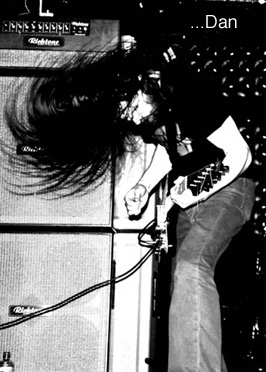 FANZINE: Tell me about The Dropouts. Priestess used to be called The Dropouts but now some of The Dropouts are The Stills, right?
FANZINE: Tell me about The Dropouts. Priestess used to be called The Dropouts but now some of The Dropouts are The Stills, right?
MIKEY HEPPNER: Um, yeah. There’s a pretty big distinction in the two completely separate entities that were both called The Dropouts. There was a group that me––and a few guys that are now in The Stills––used to be in called The Dropouts. That had ended, and about a year later I started a completely separate band but kept the name. With myself included, that was three of the four people that are now Priestess. Completely different than the original Dropouts that spawned The Stills. I just kept the name out of laziness.
FANZINE: So musically what’s the difference between that first incarnation of The Dropouts and what became Priestess?
MH: The first incarnation was a punk rock band. We weren’t really looking towards the future as a band––it was just a fun punk rock group we had. Just to play a show around town every once in a while. We recorded a demo but that’s about it.
FANZINE: You weren’t interested in taking it to the next level?
MH: Not really. That lasted about a year. I wanted that group to get more serious. Get away from the jovial punk rock thing. I wanted to do something a little heavier, with more involved song-writing, that kind of thing. And at the same time what was then their side project got kind of serious and that became The Stills. So that left me with a few months on my own which I spent writing songs for my next band. Just writing and trying to get people together. And when I did I just called it The Dropouts. I didn’t take into consideration that they would become The Stills and people would talk about The Dropouts and it’d be this big confusing thing.
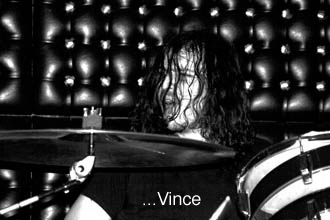 FANZINE: How many years of writing does Hello Master represent?
FANZINE: How many years of writing does Hello Master represent?
MH: There’s nothing on the record or in our live show from the original Dropouts. These are songs from the last four years––since the second incarnation. The majority of the songs were written starting about three years ago, when our current drummer Vince joined and solidified the lineup.
FANZINE: There is a continuity to the song-writing. A lot of the time you get the sense that the narrator is lording something over the person he’s speaking to––almost as a threat. "Time Will Cut You Down" for example––it sounds like a threat.
MH: That song is separate maybe from the theme. Not that there was an intentional theme, but like you said they fit together in that way. "Time Will Cut You Down" is just one frustrated person warning somebody else. And a lot of the other songs are third-person views of death. Like "Two Kids"––about two kids found dead and the story behind that. Or "Lay Down", a first-person about a guy who kills his wife.
FANZINE: That’s another one that starts with a threat––"Lay down just like in a coffin…I’ll leave you in a coffin for real". So I was wondering if you tried to use only this kind of material or if you re-focused the lyrics with that in mind. Actually, "Talk To Her" reminds me of the Beatles song "She Loves You" except it’s totally twisted. It deconstructs it in a way. In "She Loves You", the guy is trying to help his friend who’s in a relationship. But in "Talk To Her" it becomes a threat––more like, I’m going to take your girl away from you.
MH: Yeah. You know, you could even get closer to that in the Beatles song "You’re Going To Lose That Girl". (laughs) But you’re right. It was kind of fun with that one to make a really obvious, black-and-white lyrical song. It’s an obvious theme with straight narrative lyrics like that.
FANZINE: It’s true, the other songs are a little bit more oblique.
MH: A bit more abstract.
 FANZINE: So I’ve been reading all the press on you guys and a lot of it is saying, "Hey, this is a throwback to good ol’ rock’n’roll with guitar solos and everything!" Do you consider Priestess a throwback? Is that part of your project?
FANZINE: So I’ve been reading all the press on you guys and a lot of it is saying, "Hey, this is a throwback to good ol’ rock’n’roll with guitar solos and everything!" Do you consider Priestess a throwback? Is that part of your project?
MH: No, not at all.
FANZINE: Does that kind of talk rub you?
MH: No, because I know what they’re intending to say. We remind people of some of the classic bands they love and they compare us to them. It’s well-intentioned. But we didn’t start out to be a seventies rock band. We play rock music the way we think it should be played. And that includes guitar solos. (laughs)
FANZINE: I was watching Some Kind of Monster the other day––have you seen that?
MH: Yeah. (laughs)
FANZINE: And there’s that part about the guitar solo…
MH: Yeah. Whether they should keep it in or not? The philosophical argument about it? (laughs)
FANZINE: Pretty hilarious. (laughs)
MH: It is pretty funny.
FANZINE: But I understand that the press focuses on that––a lot of popular bands of the indie rock ilk––their music is devoid of things like guitar solos. Not just guitar solos––it’s like the guitar solo is a symbol for an attitude towards the music.
MH: We don’t see it as a badge. When I do a guitar solo it’s because that part of the song needs a guitar solo. It doesn’t go any deeper than that for us. It’s part of the way we want to express the music. I mean, we have a drum solo live, you know? A lot of people understand that as us trying to be a throwback. But how cool is it to see a drum solo? I mean, I like it.
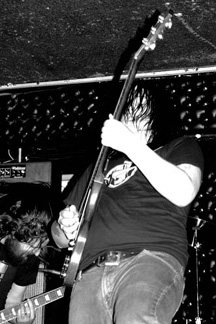 FANZINE: It’s awesome. It’s a great part of the live show.
FANZINE: It’s awesome. It’s a great part of the live show.
MH: Anybody criticizing that as a Zeppelin or a Pink Floyd thing––that’s not how we intended it.
FANZINE: There’s a lot of comparisons to AC/DC, to Black Sabbath. Do you find those favorable? Do you agree?
MH: Yeah I do. In the sense that a lot of current rock bands that are great only they focus on being heavy or having cool guitar riffs––which we also try to do––but they ignore the melody. When we write songs we focus on melody. Like right now we’re touring with two great bands––but they’re basically metal bands. If you sit down and listen to a Black Sabbath or an AC/DC record from beginning to end every song is very melodic. There are big giant hooky choruses––"You Shook Me All Night Long" is as pop and melodic a chorus as you can get. Or "War Pigs" by Black Sabbath. There’s melody in this music. That’s what I like to think people are noticing in their comparisons to us.
FANZINE: Isn’t there some tradition of French Canadian metal bands?
MH: Yeah, there is.
FANZINE: Are you influenced by it?
MH: No, we’re not. We sort of sit amidst it. I mean we’re heavy guitar music, so I guess it’s related. There are three capitals of metal, those being Scandinavia, Tampa, Florida, and Montreal. The metal history in Montreal and Quebec goes back to the beginning of metal being popular––Voivod, for example. There are a lot of bands from Montreal that are popular internationally to this day. But we have nothing to do with it really. There are tons of that stuff. We’re more influenced by the English side of St. Laurent––Tricky Woo and stuff like that.
 FANZINE: This is connected to something we sort of have to talk about––the whole idea of the "Montreal scene". When I was thinking about it I was hoping you were going to say you were influenced by these French metal bands, because I think that might be more indicative of a regional Montreal sound than the other local bands that have made it into the mainstream. You can more easily compare the tradition of heavy metal in Montreal to the Northwest grunge thing––I mean, that style of music was happening up there for nearly a decade before Nirvana broke.
FANZINE: This is connected to something we sort of have to talk about––the whole idea of the "Montreal scene". When I was thinking about it I was hoping you were going to say you were influenced by these French metal bands, because I think that might be more indicative of a regional Montreal sound than the other local bands that have made it into the mainstream. You can more easily compare the tradition of heavy metal in Montreal to the Northwest grunge thing––I mean, that style of music was happening up there for nearly a decade before Nirvana broke.
MH: Yeah, totally.
FANZINE: Or Motown, which was Sub Pop’s business model––these things had been going on for years before turning out a distinct style of music. Now you have all this press about the "Montreal sound"––but the bands getting popular haven’t been playing for more than a couple years. It doesn’t seem cohesive anyway.
MH: That’s not the metal thing though. We don’t take influence from those metal bands, they’re just there. We’ve never played a show with another Montreal metal band. I mean, I used to see them when I was working at Foufunes Electriques. The music community I know on a personal level, the bands I would see and that inspired me are Tricky Woo, Whole Hog, Bionic––the underground Montreal rock scene that didn’t ever produce anybody huge. And then there’s obviously the more recent Montreal indie rock explosion that happened last year with the Arcade Fire, The Stills, The Dears…
FANZINE: Right. But if you talk about the idea that there’s a certain sound coming from Montreal, it doesn’t really hold up when you compare the Arcade Fire with, for example, Wolf Parade, which is another popular band from Montreal. I mean, do they sound the same?
MH: And then compare Arcade Fire and Wolf Parade to Cryptopsy. You know what I mean? (laughs) It’s nothing cohesive. The fact is, it’s a small city and everybody knows each other. There’s a lot of talking behind each other’s backs and there’s also a lot of camaraderie between the different sounds. Like us Priestess guys, we’re all super-tight friends with The Stills guys, you know? And we consider ourselves out of the same music pool, yet we are completely different. We wouldn’t really be seen on the same stage together.
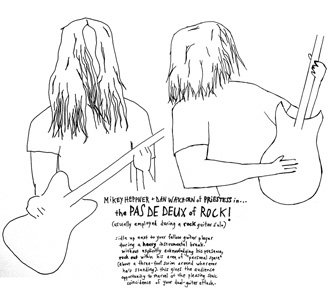 FANZINE: Musically speaking, would you align yourself with any other Montreal bands––besides the ones you’ve mentioned, I guess.
FANZINE: Musically speaking, would you align yourself with any other Montreal bands––besides the ones you’ve mentioned, I guess.
MH: Yeah, well…there is a whole lot bands in Montreal that share the same kind of aesthetic with us. We’re not an uncommon thing in Montreal.
FANZINE: Yet you seem to represent a part of the Montreal music scene that hasn’t been so hyped.
MH: Yeah I would agree with that. Because we’re a band that’s different. And we’re out on the road. And we’re going to be out on the road supporting our record for the next year and a half, touring.
FANZINE: I want to talk about touring––I hope the tour’s not wearing you down to much.
MH: No, it’s great.
FANZINE: I found an immediate complicity with your live show because you guys are such great performers. And it’s tough engaging an audience that hasn’t heard your record.
MH: Yeah, like a blind date kind of. It’s hit or miss too. Sometimes we just don’t click with the room. Every time, no matter what, me and the rest of the guys give it 100%. No matter who’s there, no matter how receptive they are. Sometimes if it doesn’t click it’s not as exciting. But we give ‘er either way.
FANZINE: And that totally comes across. Are there certain emotions you feel while your performing? Is it ever hard to conjure the energy?
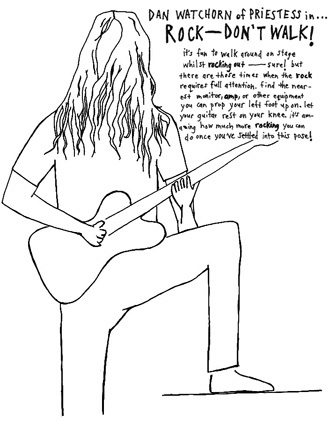 MH: No, it’s not. The hardest it gets to conjure is when you’re not getting anything from the audience. When you’re giving all you’ve got and they’re not giving back then it’s hard to keep going. Whether the audience is going completely crazy or if they’re playing the statue game, you’ve got to reach in deep and rip it out. It’s a lot of…I like to use the word passion. Or imagine running really fast for a long time––there’s sort of that natural adrenaline that keeps you going. That’s sort of what it’s like.
MH: No, it’s not. The hardest it gets to conjure is when you’re not getting anything from the audience. When you’re giving all you’ve got and they’re not giving back then it’s hard to keep going. Whether the audience is going completely crazy or if they’re playing the statue game, you’ve got to reach in deep and rip it out. It’s a lot of…I like to use the word passion. Or imagine running really fast for a long time––there’s sort of that natural adrenaline that keeps you going. That’s sort of what it’s like.
FANZINE: But there’s obviously an emotional component to some of the songs. The songs are about something––they must come from a certain place. Do you have emotional attachments to them?
MH: Not really. Especially for me as singer, I never consider the content of the song in the way I deliver it. Given the content of the songs, I think that would make for a kind of melancholy delivery. (laughs) The energy in performance is taken from a separate place.
FANZINE: The music is aggressive and distorted and, in a live setting, intensely loud. Yet there’s something really beautiful in all the craft––the different sections, the odd time-signature change. It’s highly arranged and very musical.
MH: Yeah.
FANZINE: The emotion isn’t anger.
MH: No it’s not. That’s why I describe it as passion. In the heat of passion you can be angry and happy at the same time.
FANZINE: And I just have to say that when you go into that vamp in "Everything That You Are"––like 25 seconds of whatever––live, I just can’t help but break out in laughter.
MH: Yeah.
FANZINE: It’s just so fun. What’s funny about it too is its placement. You sing a verse, you sing a chorus, and then you do this incredibly long, one-chord vamp. It rocks. It’s awesome. How did that happen?
MH: It just sort of did. Our old drummer suggested it actually. Before we recorded it it was a little shorter. Like four bars shorter or something. And when we were in pre-production we were like, fuck, let’s just do it. Let’s fucking extend that shit. It’s funny. It’s cool. (laughs)
Priestess is currently on tour with The Sword and Early Man. They will be at SXSW and later this month they join Dinosaur Jr. on their US Tour. To view dates, or to buy Hello Master (now only in Canadian release––RCA will distribute the record in the states and Europe later this year), visit www.priestessband.com. You can also see Parks’ Priestess illustrations and buy limited edition T-shirts at Old Koton Industries.